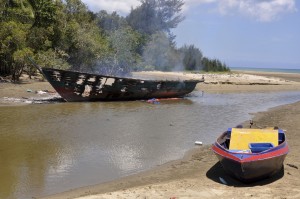
This March 9, 2013, photo released by Malaysia’s Ministry of Defense, shows a beach area which is believed to be the area where a group of Filipino gunmen entered near Tanduo village in Lahad Datu, Borneo’s Sabah state, Malaysia. Malacañang on Monday, March 11, 2013, said it was holding on to the promise of Malaysian Prime Minister Najib Razak to protect the 800,000 Filipinos living and working in Sabah. AP PHOTO/MALAYSIA’S MINISTRY OF DEFENSE
MANILA, Philippines—Malacañang on Monday said it was holding on to the promise of Malaysian Prime Minister Najib Razak to protect the 800,000 Filipinos living and working in Sabah.
Presidential spokesman Edwin Lacierda said Najib made the promise to President Aquino when they talked by phone on March 2 after Malaysia launched a military action to end the intrusion of followers of Sulu Sultan Jamalul Kiram III into Sabah.
Hundreds Filipinos are fleeing Sabah to avoid getting caught in the crossfire between Malaysian security forces and an armed group led by Jamalul’s brother Agbimuddin.
Those returning tell of abuses being committed by Malaysian police against Filipinos they suspect have links to Agbimuddin’s group.
One refugee, Amira Taradji, recounted that Malaysian police ordered Filipino men to run then shot them. Her brother was among those killed.
Lacierda said the government, through the Department of Social Welfare and Development (DSWD), was documenting reports of abuses from the refugees.
“Social welfare officials are talking to those who are coming home from Sabah to find out if there’s some truth to these reports,” he said.
If the reported abuses are true, Lacierda said, they are an offshoot of the intrusion of Agbimuddin’s group into Sabah.
“We have, from the very start, told them that this is something that may happen. The path that they have taken is the wrong path, and it is a path that would lead to violence,” he said, referring to the Sulu sultanate’s decision to press its claim to Sabah by occupying the land.
Lacierda said the government needed to verify the reports of abuses before taking action.
Civic and activist groups and lawmakers have called on the government to take action, including protesting the reported abuses to Malaysia.
The Blas F. Ople Policy Center on Monday joined the call for protection for the Filipinos in Sabah, urging the International Labor Organization to monitor abuses being committed against Filipinos in the eastern Malaysian territory.
“We wish to appeal to ILO to work with member states—Malaysia and the Philippines—in ensuring that the rights and welfare of migrant workers in conflict-afflicted communities in Sabah are upheld at all times,” Susan Ople, head of the policy center, said in a statement.
The crush of refugees from Sabah is taxing the government’s logistics, both for ferrying refugees and moving food.
Rice is becoming scarce in Tawi-Tawi, and the government is having difficulty checking the problem.
Lt. Gen. Rey Ardo, chief of the military’s Western Mindanao Command, confirmed a “developing crisis” in Tawi-Tawi—a dwindling rice supply and rising fuel prices.
Tawi-Tawi imports rice and fuel from Sabah.
“It may not be as immediate as it is, but it is a developing crisis and the indicator is the prices of fuel there have reached P100 per liter,” Ardo said.
On Sunday, the DSWD said it was running out of rice to feed the refugees.
But Ardo said the Philippine Navy could not simply “pull out one ship to ferry 1,000 sacks of rice from Zamboanga to Bongao.”
He said some of the Navy’s vessels were deployed to waters off Sabah, patrolling the sea to guide refugees fleeing from the territory and to block reinforcements for Agbimuddin’s group from Mindanao.
Another vessel is being used by the humanitarian mission that is still waiting for permission from the Malaysian government to enter Sabah.
Another problem, Ardo said, is spreading out military resources to the many islands in the south where refugees are landing.
Admiral Armando Guzman, commander of Naval Forces Western Mindanao, said the Navy had already spread out its assets to secure the safety of the refugees fleeing Sabah.—With reports from Tina G. Santos in Manila and Julie S. Alipala and Allan Nawal, Inquirer Mindanao